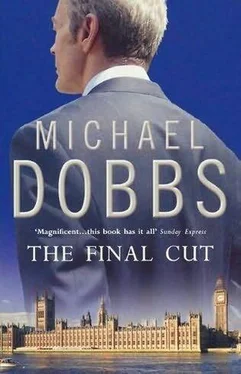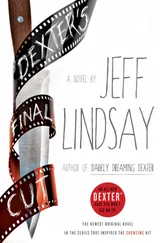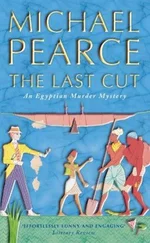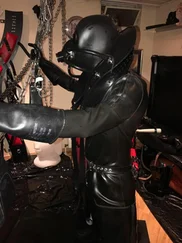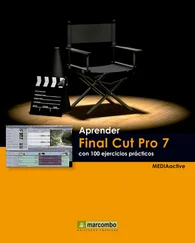Michael Dobbs - The Final Cut
Здесь есть возможность читать онлайн «Michael Dobbs - The Final Cut» — ознакомительный отрывок электронной книги совершенно бесплатно, а после прочтения отрывка купить полную версию. В некоторых случаях можно слушать аудио, скачать через торрент в формате fb2 и присутствует краткое содержание. Жанр: Политический детектив, на английском языке. Описание произведения, (предисловие) а так же отзывы посетителей доступны на портале библиотеки ЛибКат.
- Название:The Final Cut
- Автор:
- Жанр:
- Год:неизвестен
- ISBN:нет данных
- Рейтинг книги:5 / 5. Голосов: 1
-
Избранное:Добавить в избранное
- Отзывы:
-
Ваша оценка:
- 100
- 1
- 2
- 3
- 4
- 5
The Final Cut: краткое содержание, описание и аннотация
Предлагаем к чтению аннотацию, описание, краткое содержание или предисловие (зависит от того, что написал сам автор книги «The Final Cut»). Если вы не нашли необходимую информацию о книге — напишите в комментариях, мы постараемся отыскать её.
The Final Cut — читать онлайн ознакомительный отрывок
Ниже представлен текст книги, разбитый по страницам. Система сохранения места последней прочитанной страницы, позволяет с удобством читать онлайн бесплатно книгу «The Final Cut», без необходимости каждый раз заново искать на чём Вы остановились. Поставьте закладку, и сможете в любой момент перейти на страницу, на которой закончили чтение.
Интервал:
Закладка:
Now it was all too late. He had failed in everything he had touched. Others were heroes while life had stripped him of honour and all self-respect. He sat alone, forgotten, an old man with tears coursing down his cheeks, remembering. Waving a pistol. And hating.
FIVE
A man's place in history is no more than that – one place, a single point in an infinite universe, a jewel which no matter how brightly it may be polished will eventually be lost amongst a treasury of riches. A grain of sand in the hour glass.
For Urquhart, this was a hallowed scene: the shiny leather bench scuffed by the digging of anxious nails, the Dispatch Box of bronze and old buriri polished by the passing of a thousand damp palms, the embellished rafters and stanchions which, if one listened carefully and with a tuned ear, still echoed with the cries of great leaders as they were hacked and harried to eclipse. Every political career, it seemed, ended in failure; the verdict of this great Gothic court of judgment never varied. Guilty. Condemned. A place of exhortation, passing approbation and eventual execution. Only the names changed.
In recent days, whenever he turned away from the lights, there were voices in the shadows which whispered it would one day be his turn to fall, a matter only of time. As he sat on the bench they were at it again, the whispers, growing assertive, impertinent, almost heckling him. And through them all he could hear the voice of Thomas Makepeace.
'Is my Right Honourable Friend aware' – the constitutional fiction of friendship passed through Makepeace's lips like vinegar – 'that the Greek Cypriot community in this country is deeply concerned about the existence of graves which still remain hidden from the time of the war of liberation in the nineteen fifties…?'
Old memories like embers began to revive, to flicker and burn until the crackle of flames all but obliterated the words with which Makepeace was demanding that the British Government lay open its files, reveal all unreported deaths and burial sites, '… so that the tragedies of many years ago can finally be laid to rest?'
For a moment or two the House observed the unusual sight of the Prime Minister sitting stiffly in his seat, seeming unmoved and unmoving, lost in another world before cries of impatience caused him to stir. He rose stiffly to his feet, as though age had glued his joints.
'I am not aware,' he began with an uncharacteristic lack of assertiveness, 'of there being any suggestion that graves were hidden by the British…'
Makepeace was protesting, waving a sheet of paper, shouting that it had come from the Public Record Office.
Other voices joined in. inside his head he heard contradiction and confusion, talk of graves, of secrets which would inevitably be disinterred with the bones, of things which must remain forever buried.
Then a new voice, more familiar. 'Fight!' it commanded. 'Don't let them see you vulnerable. Lie, shout, wriggle, abuse, rabbit punch on the blind side, do anything – so long as you fight!' And pray, the voice might have added. Francis Urquhart didn't know how to pray, but like hell he knew how to fight.
'I believe there are great dangers in opening too many old cupboards, sniffing air which has grown foul and unhealthy,' he began. 'Surely we should look to the future, with its high hopes, not dwell upon the distant past. Whatever happened during that ancient and tragic war, let it remain buried, and with it any evils which were done, perhaps on all sides. Leave us with the unsullied friendship which has been built since.'
Makepeace was trying to regain his feet, protesting once more, the single sheet of paper in his hand. Urquhart silenced him with the most remorseless of smiles.
'Of course, if the Right Honourable Gentleman has anything specific in mind rather than suggesting some stampede through old archives, I shall look into the matter for him. All he has to do is write with the details.'
Makepeace subsided and with considerable gratitude Urquhart heard the Speaker call for the next business. His head rang with the chaos of voices, shouts, explosions, the ricochet of bullets; he could see nothing, blinded by the memory of the Mediterranean sun reflecting off ancient rock as his nostrils flared and filled with the sweet tang of burning flesh.
Francis Urquhart felt suddenly very old. The hour glass of history had turned. 'Go for it, Franco,' the producer encouraged. He sat up in his chair and dunked his cigarette in the stale coffee. This could be fun.
Behind a redundant church which had found a new lease of life as a carpet warehouse in a monotonous suburb of north London lies the headquarters of London Radio for Cyprus, 'the voice of Cypriots in the city,' as it liked to sign itself, ignoring the fact that the four miles separating it from the City of London stretched like desert before the oasis. Describing the basement of Number 18 Bush Way as a headquarters was scarcely more enlightening – LRC shared a peeling Edwardian terrace house with a legitimate travel agency and dubious accounting practice. It also shared initials with a company manufacturing condoms and an FM wavelength with a Rasta rock station that fractured ears and heads until well after midnight. Such are the circumstances of community radio, not usually the cradle for budding radio magnates and media inquisitors. LRC's producers and interviewers struggled hard to convey to their small but loyal audience an air of enthusiasm even while they did daily battle with second- and third-hand equipment, drank old coffee and tried hard to remember to turn on the answering machine when they left.
Yet this item had legs. The girl was good, somewhere behind those lips and ivories was a brain, and the old man was a fragment of radiophonic magic, his voice ascending scales of emotion like an opera singer practising arias. Passion gave him an eloquence that more than made up for the thick accent; what was more, in its own way the story was an exclusive.
'Remember, you're hearing this first on LRC. Proof that there are graves left over from the EOKA war which are buried deep within the bowels of British bureaucracy…'
The producer winced. Franco was an arsehole from which a stream of incontinence poured forth every Monday and Wednesday afternoon, but he was cheap and his uncle, a wine importer, was one of the station's most substantial sponsors. 'So what do you want?' Franco asked the pair. 'We want as many people as possible to write in support of Thomas Makepeace and his campaign to have the full facts made public. We can prove the existence of two graves, those of my uncles. We want to know if there are any more.' 'And you, Mr Passolides?'
There was a pause, not empty and mindless but a silence of grief, long enough to capture the hearts of listeners as they imagined an old man rendered speechless by great personal tragedy. Even Maria reached over to touch his hand; he'd been behaving so oddly in recent days, morose, unshaven, digging away within himself, changes which were ever more apparent since she'd been spending more time away from him. When finally his voice emerged the words cracked like a hammer on ice. 'I want my brothers.'
'Great, really great,' Franco responded, shuffling his papers in search of the next cue.
'And I want something else. The bastardos who murdered them.' The voice was rising through all the octaves of emotion. 'This was not war but murder, of two innocent boys. Don't you see? That is why they had to burn my brothers' bodies. Why they could never admit it. And why this miserable British Government continues to cover it up. Wickedness! Which makes them as guilty as those men who pulled the trigger and poured the petrol.'
'Yeah, sure,' Franco stumbled, scratching his stubble, unused to anything more heated than a weather report. 'So I suppose we'd all better write to our MPs and give Mr Makepeace a hand.'
Читать дальшеИнтервал:
Закладка:
Похожие книги на «The Final Cut»
Представляем Вашему вниманию похожие книги на «The Final Cut» списком для выбора. Мы отобрали схожую по названию и смыслу литературу в надежде предоставить читателям больше вариантов отыскать новые, интересные, ещё непрочитанные произведения.
Обсуждение, отзывы о книге «The Final Cut» и просто собственные мнения читателей. Оставьте ваши комментарии, напишите, что Вы думаете о произведении, его смысле или главных героях. Укажите что конкретно понравилось, а что нет, и почему Вы так считаете.
